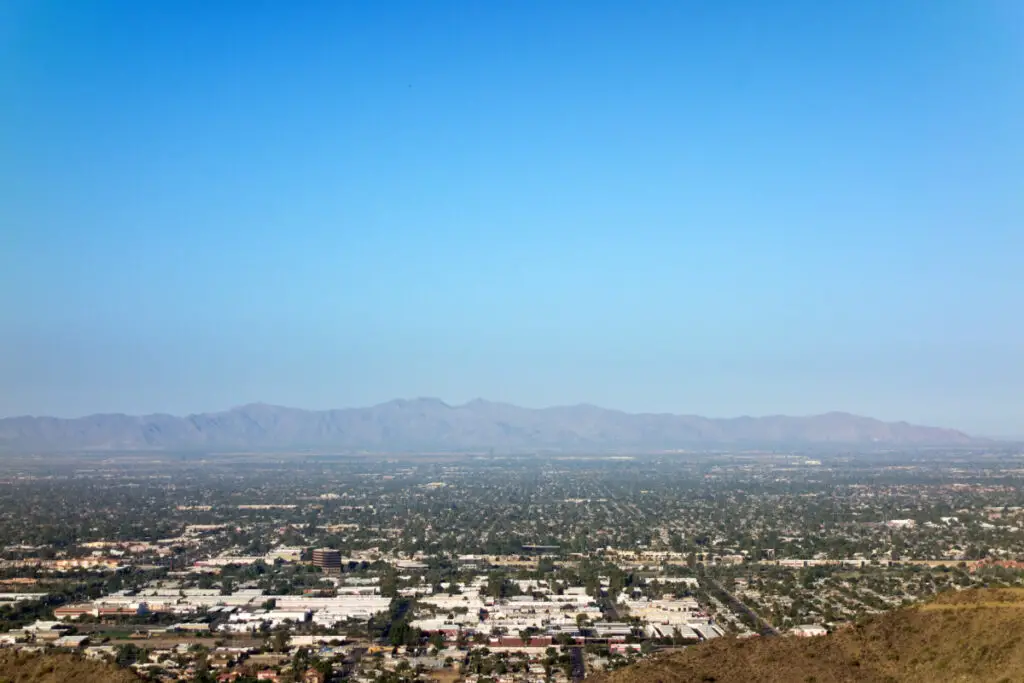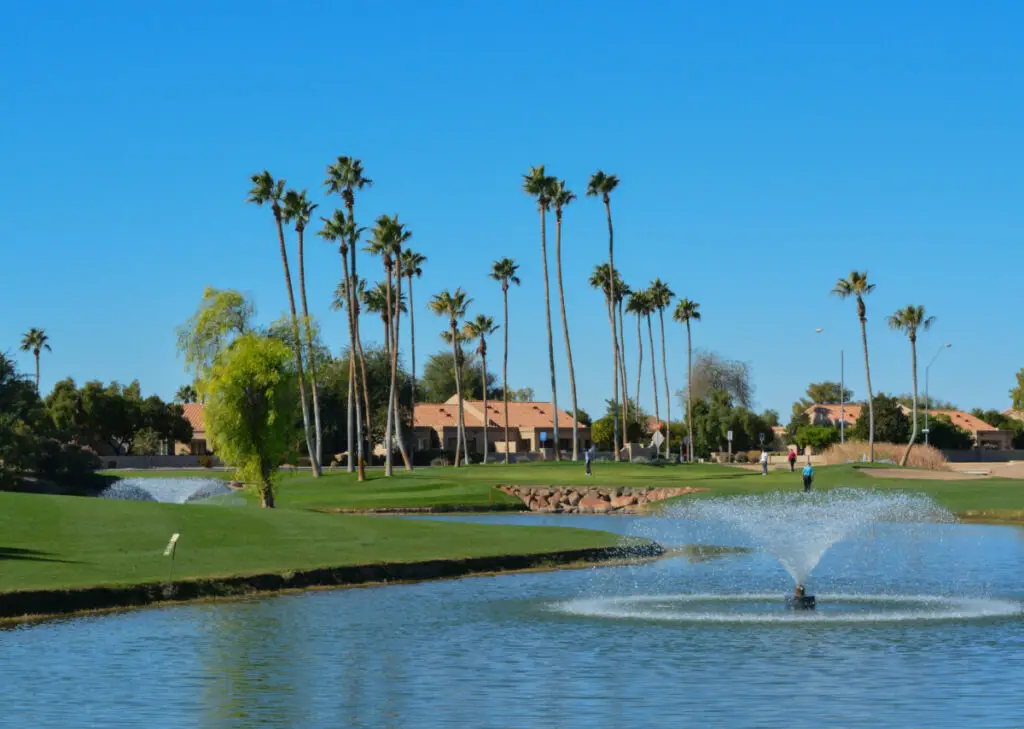
Politics are the source of a lot of controversies these days, and many people want those around them to have the same political beliefs that they do. If you live in Glendale, Arizona, are your neighbors more likely to be liberal or conservative?
Glendale, Arizona is not a liberal city and is moderately conservative. The majority of residents voted for the Republican candidate in 5 of the last 6 presidential elections. Maricopa County, Glendale’s county, is also moderately conservative, and Arizona is a swing state that leans conservative.
There are many factors to the political climate of a city. If we look at the results of presidential elections, local leaders, supported policies, and demographics of Glendale, we can get an accurate idea of the political leanings of the city.
Presidential Elections
The results of presidential elections in a city are a big indicator of the city’s political climate. The two major political parties in the United States represent the liberal and conservative perspectives. The Democratic party has mostly liberal members and supports liberal policies. The Republican party has mostly conservative members and supports conservative policies. If the majority of residents vote for the Democratic candidate, the city is mostly liberal. If the majority of residents vote for the Republican candidate, the city is mostly conservative.
It is important to not only consider which candidate earned the most votes, but how many votes they won by. In every election, a certain percentage of votes are for the Democratic candidate, and another percentage of the votes are for the Republican candidate. The difference between these percentages is how much the winning candidate won by. If the difference is high, the winning candidate won by a lot and the city is solidly liberal or conservative. If the difference is low, the city is closer to being evenly split between liberal and conservative.
Arizona is a swing state . Most states can be counted on to vote for either the Democratic or Republican candidate. Swing states, however, can go either way, though they tend to lean one way or the other. The final results of elections tend to come down to the results in swing states.
. Most states can be counted on to vote for either the Democratic or Republican candidate. Swing states, however, can go either way, though they tend to lean one way or the other. The final results of elections tend to come down to the results in swing states.
Arizona is a swing state that leans conservative. The majority of residents voted for the Republican candidate in 5 of the last 6 elections. The differences between the percentages of Democratic and Republican votes were less than 10% in every election except for the 2004 election. The lowest difference was 0.3% in 2020, and the highest was 10.5% in 2004.
In the 2020 presidential election, 49.4% of Arizona residents voted for the Democratic candidate, and 49.1% voted for the Republican candidate. The difference between the percentages was 0.3%, the lowest it has been in the time since 2000.
Maricopa County, the county in which Glendale is, is a moderately conservative area. The Republican candidate got the most votes in 5 of the last 6 elections. In half of the elections, the differences between the percentages were close to 10%. In two of the remaining elections, the differences were close to 2%. The highest difference was 14.64% in 2004, and the lowest difference was 2.17% in 2020.
area. The Republican candidate got the most votes in 5 of the last 6 elections. In half of the elections, the differences between the percentages were close to 10%. In two of the remaining elections, the differences were close to 2%. The highest difference was 14.64% in 2004, and the lowest difference was 2.17% in 2020.
In the 2020 presidential election, 50.13% of Maricopa County residents voted for the Democratic candidate, and 47.96% voted for the Republican candidate. The difference was 2.17%, which was the lowest it has been this century.
Glendale, like its county and state, is mostly conservative . The majority of residents voted for the Democratic candidate in 2020, but the Republican candidate got the most votes every other year. From 2000 to 2012, the difference between the percentages was over 10%, but it was less than 10% in the last two elections.
. The majority of residents voted for the Democratic candidate in 2020, but the Republican candidate got the most votes every other year. From 2000 to 2012, the difference between the percentages was over 10%, but it was less than 10% in the last two elections.
From 2018 to 2021, there were 16,868 contributions to the Democratic party in Glendale. This added up to $1,251,845. During that same time, there were 6,135 contributions to the Republican party, totaling $2,055,440. Though there were almost 3 times more donations to the Democratic party, the Republican party took in almost twice as much money. This is because the average size of contributions to the Republican party was about 4.5 times larger than the average size of contributions to the Democratic party.
Local Leaders

The local leaders of a city represent the political climate. The local leaders were elected by the people based on their beliefs and promises. Looking at the enacted policies, campaign platforms, and party affiliations of local leaders can help us know about the political climate.
Mayor
The mayor of Glendale is one of the most important elected officials. The mayor represents the city in state, national, and international matters. The mayor is also a member of the city council and leads city council meetings, as well as city ceremonies.
The current mayor of Glendale is Jerry Weiers . He was elected in 2013, then reelected in 2016 and 2020. His current term will end in 2024. He won the 2016 election with 50.78%, winning by 405 votes. He also won the 2020 election by 53.6%, winning by 2,683. Mayor Weiers has served as a member of the Arizona House of Representatives from 2005 to 2013.
. He was elected in 2013, then reelected in 2016 and 2020. His current term will end in 2024. He won the 2016 election with 50.78%, winning by 405 votes. He also won the 2020 election by 53.6%, winning by 2,683. Mayor Weiers has served as a member of the Arizona House of Representatives from 2005 to 2013.
Mayor Weiers has focused his time in office on building up the city financially, increasing the funding of the police department, and improving public works.
Mayor Weiers is a member of the Republican party, and his time in the Arizona House of Representatives was as a Republican representative. His initiatives and focuses also support the idea that he is of a conservative mindset.
City Council
The Glendale City Council is a board of elected officials that serves as the primary legislative body of the city. The city council adopts the budget, imposes taxes, and creates or changes laws. There are 7 city council members, including the mayor. The mayor is elected by the whole city, but the other 6 members are each elected by one of the city’s 6 districts.
is a board of elected officials that serves as the primary legislative body of the city. The city council adopts the budget, imposes taxes, and creates or changes laws. There are 7 city council members, including the mayor. The mayor is elected by the whole city, but the other 6 members are each elected by one of the city’s 6 districts.
All of the current city council members are nonpartisan, but the goals and initiatives of the city council suggest that it is made up mostly of conservative members.
Policies
The policies that the people in a city support are another indicator of the political climate. Certain policies are likely to be supported or opposed by liberals or conservatives. Fewer abortion restrictions, more gun control laws, and legal same-sex marriage are all policies that are likely to be supported by liberals and opposed by conservatives.
Abortions
Abortions in Arizona must be performed before 20 weeks of gestation unless the patient’s life is in danger. Patients must receive counseling and an ultrasound at least 24 hours before getting an abortion. Health plans, insurance policies for public employees, and Medicaid cannot cover abortions. The parents of a minor must consent before a minor can receive an abortion.
of gestation unless the patient’s life is in danger. Patients must receive counseling and an ultrasound at least 24 hours before getting an abortion. Health plans, insurance policies for public employees, and Medicaid cannot cover abortions. The parents of a minor must consent before a minor can receive an abortion.
In 2017, there were 11 facilities in Arizona providing abortions, 8 of which were clinics. This is an 11% decline from 2014. 80% of Arizona clinics don’t have abortion clinics, leaving 18% of women without access to abortion clinics.
Glendale residents tend to support the high number of abortion restrictions or want it to be completely restricted, which is consistent with a conservative perspective.
Gun Control Laws
In 2020, Arizona had the 20th-highest gun death rate and the 5th-highest crime gun export rate in the country. Arizona gun laws include a prohibition of firearms at polling places and mental health record reporting. Arizona gun laws don’t include universal background checks, gun owner licensing, domestic violence gun laws, assault weapon or large capacity magazine restrictions, waiting periods, concealed and open carry regulations, and child access prevention laws.
a prohibition of firearms at polling places and mental health record reporting. Arizona gun laws don’t include universal background checks, gun owner licensing, domestic violence gun laws, assault weapon or large capacity magazine restrictions, waiting periods, concealed and open carry regulations, and child access prevention laws.
Glendale residents tend to support the low number of gun control laws, which is consistent with a conservative perspective.
Same-Sex Marriage
Arizona legalized same-sex marriage on October 17, 2014 , and was the 30th state to do so, tied with Alaska. This was about eight months before the Supreme Court mandate required all states to legalize same-sex marriage. Glendale residents generally opposed the legalization of same-sex marriage.
, and was the 30th state to do so, tied with Alaska. This was about eight months before the Supreme Court mandate required all states to legalize same-sex marriage. Glendale residents generally opposed the legalization of same-sex marriage.
Demographics

The population of Glendale is about 255,307 people, and the population density is about 4,292 people per square mile. 51.0% of the population is female, and 49.0% is male. The median age is 32.9, and the average number of people per household is 2.9.
of Glendale is about 255,307 people, and the population density is about 4,292 people per square mile. 51.0% of the population is female, and 49.0% is male. The median age is 32.9, and the average number of people per household is 2.9.
The racial makeup of Glendale is as follows:
of Glendale is as follows:
- White: 48.6%
- Black: 5.9%
- Hispanic/Latino: 37.3%
- Asian: 4.3%
- Native American: 1.2%
- Hawaiian/Pacific Islander: 0.2%
- Two or More Races: 2.4%
- Other: 0.2%
The average income in Glendale is $21,817 per year. The median household income is $46,855 per year. The unemployment rate is 7.0%. The sales tax rate is 9.2%, and the income tax rate is 4.2%.
in Glendale is $21,817 per year. The median household income is $46,855 per year. The unemployment rate is 7.0%. The sales tax rate is 9.2%, and the income tax rate is 4.2%.
83.4% of Glendale residents are high school graduates, and 24.9% are only high school graduates. 13.9% have 2-year degrees, 21.4% have 4-year degrees, 1.1% have master’s degrees, and 0.7% have professional degrees.
of Glendale residents are high school graduates, and 24.9% are only high school graduates. 13.9% have 2-year degrees, 21.4% have 4-year degrees, 1.1% have master’s degrees, and 0.7% have professional degrees.
39.8% of Glendale residents are religious. 38% are Christian, 0.4% are Jewish, 1.1% are of an eastern faith, and 0.2% are affiliated with Islam.
of Glendale residents are religious. 38% are Christian, 0.4% are Jewish, 1.1% are of an eastern faith, and 0.2% are affiliated with Islam.
The rate of violent crime in Glendale on a scale of 1 to 100 is 27.3. The rate of property crime on the same scale is 72.5. The rate of violent crime is slightly higher than the national average, and the rate of property crime is significantly higher than the national average.
in Glendale on a scale of 1 to 100 is 27.3. The rate of property crime on the same scale is 72.5. The rate of violent crime is slightly higher than the national average, and the rate of property crime is significantly higher than the national average.

